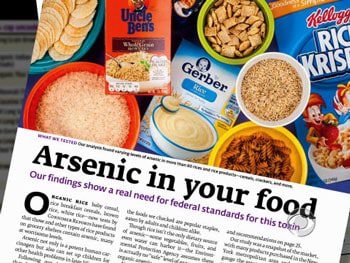
In a previous Consumer reports investigation, arsenic was found in rice and rice products. Now, data from the U.S. Food and Drug Administration (FDA) coincides this finding, with levels of arsenic being comparable to that found by Consumer Reports, Washington Post reports. Additionally, the agency found arsenic in beer, which sometimes contains rice as an […]
 In a previous Consumer reports investigation, arsenic was found in rice and rice products. Now, data from the U.S. Food and Drug Administration (FDA) coincides this finding, with levels of arsenic being comparable to that found by Consumer Reports, Washington Post reports. Additionally, the agency found arsenic in beer, which sometimes contains rice as an ingredient. Inorganic arsenic is known to be a carcinogen, but there are no federal regulations for it in most food, including juice and rice.
In a previous Consumer reports investigation, arsenic was found in rice and rice products. Now, data from the U.S. Food and Drug Administration (FDA) coincides this finding, with levels of arsenic being comparable to that found by Consumer Reports, Washington Post reports. Additionally, the agency found arsenic in beer, which sometimes contains rice as an ingredient. Inorganic arsenic is known to be a carcinogen, but there are no federal regulations for it in most food, including juice and rice.
Consumer reports analyzed FDA data from over 1,300 white rice samples, Washington Post reports. The analysis revealed the highest levels of inorganic arsenic in the parboiled version, with an average of 114 parts per billion (ppb). The lowest amounts of arsenic at an average of 59 ppb. It was also found that, compared to other areas in the United States, medium-grain rice from California tended to have lower levels of inorganic arsenic.
According to the Washington Post, emerging research continues to show that long-term exposure to arsenic can be dangerous to your health. In the past year, the FDA found that the levels of inorganic arsenic was higher than those reported by Consumer Reports in 2012 in some rice products, including rice beverages used as milk replacement. These findings help support Consumer Reports’ recommendation that children younger than 5 should not drink these on a daily basis.
The FDA also tested 65 beer samples that contained some form of rice as an ingredient, and found elevated levels of arsenic. The federal drinking water limit for total arsenic is 10 ppb, and 10 samples contained inorganic arsenic levels between 15 ppb and 26 ppb. The agency does not plan to do any more testing of beers, Washington Post reports.
FDA spokeswoman Theresa Eisenmann said that based on their findings the FDA is “conducting a risk assessment as the next step in a process to help manage possible risks associated with the consumption of rice and rice products,”
Last July, researchers in the UK and India published a groundbreaking study showing that consuming rice with high amounts of total arsenic may cause genetic damage in cells that are related to cancer.
The FDA made efforts to reduce the amount of arsenic exposure in food last year by proposing an “action level” of 10 ppb of inorganic arsenic in apple juice. However, Consumer Reports took issue with this measure because most samples already contain levels lower than 10 ppb. CR pushed for stricter proposals that “creates an incentive for the marketplace to reduce levels of inorganic arsenic in apple juice and thereby reduce risk — not simply maintain the status quo.”


